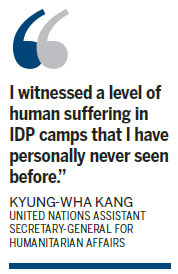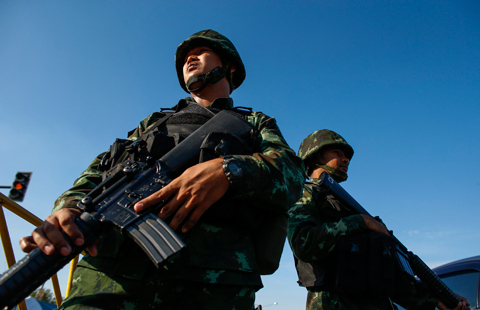Suffering at Myanmar's Muslim camps is 'appalling'
By Associated Press in United Nations (China Daily) Updated: 2014-06-19 07:08A top UN humanitarian official said on Tuesday she witnessed "appalling conditions" and the worst human suffering she has ever seen in camps for stateless Rohingya Muslims in Myanmar's violence-torn Rakhine State.
Assistant Secretary-General for Humanitarian Affairs Kyung-wha Kang said that because of severe restrictions on their freedom of movement both in camps and isolated villages, many Muslims can't rebuild their lives and have "wholly inadequate access to basic services including health, education, water and sanitation."
Myanmar, a predominantly Buddhist nation of 60 million, considers the Rohingya Muslims to be immigrants from Bangladesh and denies them citizenship and related rights, even though many were born to families who arrived in the country generations ago.
Almost all of the 1.3 million Rohingya live in Rakhine state, where sectarian violence in the last two years has killed about 280 people and forced another 140,000 to flee their homes. Most of the victims have been Rohingyas chased down by Buddhist mobs. As a result, most Rohingya are now living in hot, dirty camps for internally displaced people, or IDPs.

Kang, who visited Myanmar last week to assess the humanitarian challenges, said that "in Rakhine, I witnessed a level of human suffering in IDP camps that I have personally never seen before" - and the Muslim camps were the worst.
One Rohingya camp Kang visited was isolated, had no schools and was close to sea level so it was impossible to dig effective latrines. The people couldn't leave and depended on assistance coming in for their basic needs, she said.
"It has already been two years," Kang said. "It's not a human situation to be locked into these desperate situations for any length of time."
She said the authorities insist there must be restrictions on movement in the Muslim camps for security reasons.
But Kang said freedom of movement is a basic human right, and the UN has urged Myanmar's government to expand freedom of movement for Muslims, "even with security considerations taken into account."
Kang also said there have been major difficulties in delivering aid to IDPs in Rakhine.










